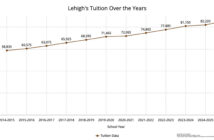Throughout the year, you’ll see yellow Amicus doors, Lehigh flags hanging out of windows and Lehigh bumper stickers while walking through Bethlehem’s South Side. Come August, you’ll also find an influx of students ordering a Lehigh-themed sandwich at the Goosemen, grabbing a beer at F&A Grog House or shopping at CTown.
Lehigh students are physically woven throughout the South Side, and some are even enmeshed with its local politics. This may manifest in the form of students protesting in support of Palestine alongside Bethlehem residents or calling on the Bethlehem City Council to increase voting accessibility.
South Side residents have watched their neighborhoods be taken over by overpriced establishments and luxury high-rises that were not built to serve them, like Five 10 Flats, The Marshall Valley and South Side Commons. This gentrification can be traced, in part, to Lehigh students moving into the area.
It’s understandable these residents might be wary of student involvement in local politics — especially because students may look at issues through a different lens, as most students arrive in and leave the area in just a four-year stint, and Lehigh’s student body is ever-changing.
But for many students, college is more than four years of classes. Bethlehem might be the first place they cast a vote, the first place they pay rent and the first place they land an internship. It’s the place where they take their first steps into adult life, and it sometimes becomes a city they grow to love and, therefore, one they care enough about to try to improve.
Even if college is just a brief flash of a student’s life, it represents a period of time where they’ll find both the passion and the time to fight for the causes they care about.
Lehigh students engaging in local politics is not new, and it shouldn’t be dismissed or discouraged.
In 1960, students protested racial discrimination, and in 1967, they joined peers from Moravian University and Northampton Community College to denounce the Vietnam War by picketing outside Bethlehem’s Selective Service draft boards.
This is not a Lehigh-specific phenomenon either, as the history of student political action across the country is rich and far-reaching. From protests against McCarthyism in the 1950s to anti-apartheid movements in the ‘90s, college students have consistently shown up — their idealism nurtured by campuses and their schedules still largely open to their own free will.
Bethlehem’s 3rd Ward, where most on-campus students vote, saw record-breaking voter turnout in the 2024 presidential election — 45%, up from 39% in 2016. Many students waited in six-hour-long lines to cast their ballot.
The students who vote, attend city council meetings, and organize and participate in protests are often the most informed and engaged in the community. And yet, despite all of the devotion and research that goes into becoming involved in this capacity, student political action continues to be stifled and dismissed.
In 1968, during an anti-Vietnam protest, Columbia University called in police to disperse students staging a peaceful sit-in against the university’s ties to military research. More than 700 were arrested.
In 2024, Columbia students staged a pro-Palestine sit-in in the very same building — Hamilton Hall. After President Donald Trump pulled funding from the university over the protest, Columbia suspended, expelled or revoked degrees of several students who participated.
The crackdown didn’t stop there, as Columbia also sent notices to students who had written op-eds, co-hosted art exhibits or shared social media posts that were critical of Israel.
Nadine Strossen, a professor at New York Law School, told Time Magazine there’s a credible argument that Columbia is cracking down on students’ free speech in response to government pressure.
“And when an ostensibly private sector action is resulting from pressure by the government, it is as if the government itself had directly acted,” Strossen said.
Urgent questions about the state of free speech in higher education have arisen, especially as Columbia’s actions seemed to stem from pressure by the federal government — the very institution meant to safeguard First Amendment rights.
At Lehigh, also a private university, protests have sparked similar free speech concerns.
In April 2024, the Student Political Action Coalition hosted Palestine Solidarity Week and was subsequently contacted for violating two Code of Conduct principles. Five Muslim Lehigh Valley residents were also cited as violating Lehigh’s Principles of Our Equitable Community, as reported on in The Brown and White.
The state of college political action seems as though it’s in a freefall, as Trump threatened to pull federal funding from institutions that allowed “illegal protests” on Truth Social — a social media platform he owns.
He went on to write, “Agitators will be imprisoned/or permanently sent back to the country from which they came. American students will be permanently expelled or, depending on the crime, arrested. NO MASKS!”
On Sunday, NPR aired interviews with Americans who worry about the future of free speech under the Trump Administration. At Lehigh, we’re already seeing the first trickle of these effects.
So, it’s more important than ever to stay engaged and push back.
People don’t fight to change or improve a place they don’t care about. And while the institution of Lehigh has contributed to the gentrification of the South Side, there are students who love the community they’ve found and want to use their voices for good while they’re here.
It’s easy to despair and give into political fatalism — an ideology that purports there is nothing you can do to create social transformation. But the only way to create the change you seek is to do something about it.
As James Baldwin said in 1971, “The world is held together, really it is held together, by the love and the passion of a very few people.”
Let students be among those few.






Comment policy
Comments posted to The Brown and White website are reviewed by a moderator before being approved. Incendiary speech or harassing language, including comments targeted at individuals, may be deemed unacceptable and not published. Spam and other soliciting will also be declined.
The Brown and White also reserves the right to not publish entirely anonymous comments.